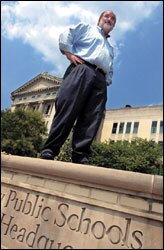Samuel C. Stringfield, a nationally known expert on school improvement and a former member of the Baltimore City school board, died July 31 at his home in Cincinnati. He was 67.
Stringfield was a voracious education scholar, traveler, and writer—he visited 38 countries and all of the United States, and wrote more than 170 articles, books, and chapters, according to the International Congress for School Effectiveness and Improvement, of which he was a founding community member.

The late scholar was passionate about applying education research knowledge into practice. As a Baltimore City school board member in the late 1990s and early 2000s, Stringfield helped oversee one of the most historically troubled urban school districts in the nation. During his tenure, the district faced down fiscal insolvency and a possible state takeover.
But there were times when Stringfield, known for his theories on “high reliability organizations” and his work on school effectiveness and comprehensive school reform, gleamed with pride in reflection of his tenure in Baltimore. On his watch, the 89,000-student school system saw its rock- bottom test scores begin to rise.
“It was one of the best educations I’ve ever had,” the former Johns Hopkins University researcher told Education Week in 2004. “I was and remain mesmerized by it.”
Raised in Waynesville, N.C., Stringfield graduated from the University of North Carolina. In addition to his school board tenure in Baltimore, Stringfield’s professional career included positions as a research scientist, distinguished university scholar, and director of the school of education at Johns Hopkins University, the University of Louisville, and the University of Cincinnati, respectively.
“Our field has lost a great man and a great champion for children at risk,” writes Stringfield’s former colleague at Johns Hopkins, Robert Slavin, in a Huffington Post blog. “We’ll miss him a lot.”